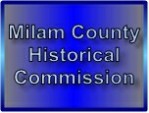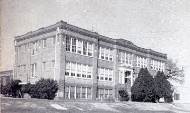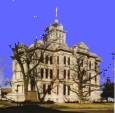Milam County Historical Commission
Milam County, Texas
Milam County, Texas






Church helps Milam community survive
Jeanne Williams - Temple Daily Telegram
March 14, 2011
SHARP — The piano may be out of tune, the sparse congregation may not sing praises to
God in perfect harmony, and a seminary student comes only once a month to preach the
gospel in the Sharp Presbyterian Church, but “it’s a wonderful spiritual thing to
worship there,” says Stan Graves, a native of the rural Milam County community of
Sharp.
Sharp “grew up around a Presbyterian Church that was established in the 1870s,” states
the Handbook of Texas On-Line in a concise nine-sentence history. Other accounts
describe the “pretty, white” church built in 1902 with influences of Italianate style
of architecture, a truncated tower, window hoods and horizontal milled siding. The
first minister was the Rev. W.E. Copeland, a Scot who spoke with an accent and who
had lost his leg in the Civil War.
With a church as its epicenter and a number of “hearty,” deeply rooted families, this
agriculture community has stayed alive, unlike its ghost-town neighbors of Lilac,
Tracy, Friendship, Duncan, Oakville and San Andres, said Graves, a Rockdale High School
graduate and Texas Historical Commission Division of Architecture director.
Sharp boasts six Texas Historical Markers, honoring the passing of Milam County’s
oldest Confederate veteran, William Persky; the community; the cemetery; general store;
Presbyterian Church; and Urban Cemetery. Texas Ranger Stephen Thomas Slater, an Indian
agent who served under Sam Houston, joined Capt. Spence’s Company during the Snively
Expedition and enlisted in the Texas State Troops under Capt. A.J. Berry’s Co. C, is
buried in the Sharp Cemetery.
The community on FM 487 about 12 miles northwest of Rockdale was named for Dr. William
Franklin Sharp, Graves’ maternal great-grand-father. A post office opened at Sharp in
1901 but was discontinued in 1906. A WPA-era school still stands, as does other
tangible evidence of a once-thriving town. In 1960 Sharp and neighboring communities
elected to be consolidated with Rockdale. In 1933, some 25 residents called Sharp their
home. With in a few years the population increased to 100, but dropped to 60 by 1952.
Seventy-five residents were counted in 2000.
“Sharp was just a regular hub with its general store and cotton gins,” Graves said. “It
had the largest school district in the county at one time.”
Bill Bartlett, another Sharp native and 1947 graduate of Sharp High School, remembers
when the town boasted about five cotton gins, as does C.J. Harbuz of Salado, who also
grew up in Sharp.
Ms. Harbuz remembers a closely knit group of friends, relatives and neighbors walking
to church. If a cotton gin stopped running at night “everyone got up and went to see
what was wrong with it.” Ms. Harbuz described Sharp at one time as a typical,
Texas-style agricultural boom town — a farmer’s town. Her parents, Jerry and Robert
Dean (her mother endured a boy’s name) Harbuz, operated a grocery store and garage
until the late 1980s. When roads were icy, her father, who was in his 80s, would drive
to Rockdale and pick up supplies for people. Community events, parties, musicals and
dances provided entertainment, she said.
A Sharp history written by Owen Rachel Graves states that the community boasted
Roseland Hall, Dinker Hall and the Woodmen Hall. Ernest Backhaus and his band played in
the years around 1915. Lawrence Welk, popular accordionist and polka-style band leader,
performed in Sharp during the 1930s.
“I remember my dad talking about Lawrence Welk,” Ms. Harbuz said. In Welk’s
autobiography, “Wunnerful, Wunnerful!” he writes about a time in the 1930s when he
spent a lot of time in Texas performing one-night stands, but does not specifically
mention the majority of towns where he and his band played.
Why the community was christened in honor of a country physician is explained in Mrs.
Graves’ history. Sharp, “a pioneer doctor in Davilla, practiced his profession over a
wide area, riding horseback to see his patients.” Well-known by the people, he twice
was elected to theTexas Legislature, and served many years on the State Medical Board
in Austin.
“Having studied medicine in Kentucky he was greatly respected for his medical
knowledge, and was loved for his devotion to his profession and concern for humanity,”
her history says. “His financial assistance helped many young people further their
education. Not only did he administer medical aid, but food, clothing and shelter when
needed without a thought of being repaid.”
In 1901 a post office was established in this little community without a name.
C.R.Campbell submitted the name Sharp in honor of this beloved doctor, the history
stated. “It was accepted. Now we citizens say that we live in Sharp with a tinge of
pride.”
jwilliams@tdtnews.com
.
All articles from the Temple Daily Telegram are published with the permission of the
Temple Daily Telegram.
All credit for this article goes to
Jeanne Williams and the Temple Daily Telegram
Temple Daily Telegram.
All credit for this article goes to
Jeanne Williams and the Temple Daily Telegram